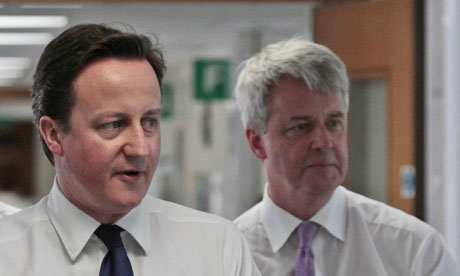Kenneth Clarke accuses PM of treating Andrew Lansley badly
As top Tories draw up list of undermined ministers, allies say health secretary has been 'abandoned' over reforms

David Cameron and Andrew Lansley during a visit to a patient ward at Frimley Park hospital in Surrey. Photograph: Lefteris Pitarakis/AFP/Getty Images
Kenneth Clarke has complained in private about the treatment of the health secretary, Andrew Lansley, amid mounting concerns across Whitehall that Downing Street abandons ministers when opposition grows to agreed policies.
The justice secretary, who made his name as a radical health secretary under Margaret Thatcher, has told colleagues that the treatment of Lansley is unfair.
Allies argue that Lansley has been humiliated in the past 10 days in an operation orchestrated by No 10 and George Osborne, amid alarm among Tory leaders at the backlash against the health reforms. Downing Street also felt it had to act after the Liberal Democrats voted against the reforms at their spring conference.
The chancellor's circle were first to let it be known that the health secretary's controversial proposals to hand 60% of the NHS budget to new GP-led consortiums would be delayed. On Wednesday Lansley had to appear alongside Cameron and Nick Clegg to announce that the passage of the health and social care bill would be paused for two months while a "listening exercise" is held to take on board the concerns of health professionals.
One figure familiar with the thinking in Downing Street explained the approach, saying: "We have to get the bill through the House of Lords which means we have to make changes. It is as simple as that. It was a case of summoning a cabinet minister to No 10, giving him a pen and notepad and telling him what will happen. That is what you have to do.David Cameron does not want to go into the election 20 points behind Labour on health."
Senior Tories believe a pattern of behaviour is emerging in which Downing Street agrees a policy then abandons the minister when opposition grows.
Lansley's central reform – to hand commissioning powers to GPs – was at the heart of the Tory plans for the NHS in the party's general election manifesto. The coalition agreement was less clear cut, though Lansley was not directly involved in the negotiations with the Lib Dems.
One Whitehall source said: "One whiff of gunpowder and Downing Street runs away. People also think there is the whiff of cowardice in No 10 when it comes to arguing the merits of policies that have been agreed. Andrew Lansley was appointed by Cameron who knew two key things about him. He has a deep knowledge of the NHS and is not a good communicator. Now he is being hung out to dry."
Senior Tories are drawing up lists of ministers who have been undermined by No 10 despite agreement on policies:
• Kenneth Clarke and knife crime. A consultation paper, Breaking the Cycle, which was agreed with No 10, ditched Cameron's election campaign pledge to jail anyone convicted of carrying a knife. Downing Street sources briefed against Clarke after tabloids reacted against his plans.
• Caroline Spelman and forests. The environment secretary agreed her proposals to change the ownership of 258,000 hectares of state-owned woodland. But a backlash, led by the Sunday Telegraph, prompted a U-turn and an apology from Spelman ordered by No 10.
• Lady Warsi and her speech in January in which she said that Islamophobia had "passed the dinner-table test". Downing Street sources said that Warsi's office did not clear the speech properly. But even her critics believe she was treated harshly.
One source said: "Cabinet ministers are, one by one, drawing up the dots and realising there is no collegiality. They are being left on their own and isolated."
One veteran Tory, who has known Cameron for nearly 20 years, said: "David is very short termist. Everything he does is about getting good daily headlines. He also has a habit of leaving some colleagues high and dry. It is interesting that these never seem to include members of the prime minister's Etonian circle."
Downing Street sources admit that they have struggled to take a grip over Whitehall. They blame a decision, which has recently been reversed, not to establish a traditional No 10 policy unit that shadows the work of individual departments.
Lansley insists he is happy with the "listening exercise", which is expected to lead to two major changes to the health and social care bill. The membership of the GP-led consortiums is likely to be widened to include clinicians and, in a nod to Liberal Democrats, they are likely to include more locally elected officials.
Clarke has let it be known that he backs Lansley's plans. "Ken is extremely supportive of the reforms but questions whether people have grasped the full magnitude," one source said.
No comments:
Post a Comment